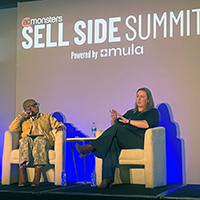Serious illness usually goes hand in hand with the inability to sleep. But who can you talk to at 2 a.m. when your mind won’t rest?
At Cancer Treatment Centers of America (CTCA,) patients can talk to a live oncology information specialist 24/8, 365 days a year by “clicking to chat” online. This network of hospitals has programs in Illinois, Oklahoma, Washington and Philadelphia. But its online presence is there for anyone—anywhere—at any time.
“The Cancer Treatment Centers of America are all about the patient,” says Adam Lefton, Web master for CTCA. “People are treated in hospitals like they’re a number. But at CTCA it’s not about us, it’s about them. And if they can’t sleep and need to talk. we’re there for them.”
CTCA isn’t only there for its own patients; it works hard at spreading a message of hope and options to all people with cancer. In fact, Lefton stresses that his number one mission is not to bring in patients. It is to reach cancer patients who have been given a grim diagnosis with a ray of hope. They may be looking online for options and information so we want to be there for them, he says.
Lefton gives credit to Oneupweb, for helping CTCA stay on top of the search engine lists making it easy to find.
“They understand search engines and help us make sure that when we build a site and provide content we do it in a way that Google, Yahoo and MSN understand. They give us high ratings because their engines realize that this is the site that people need to visit if they’re looking for cancer treatment,” says Lefton.
And once on the CTCA site, patients and prospects are given the option to speak with a live oncology specialist on every Web page.
When a patient initiates a conversation by clicking to chat, they are greeted by one of 35 oncology specialists on a screen that resembles the AOL instant messenger screen. The specialists are trained by CTCA and use a helper tool that provides them with a way to easily answer typical or frequently asked questions.
According to Lefton, that tool which was built in-house is used primarily to save time typing. At any time, live representatives are available to speak directly to the caller if requested.
In the event of overflow calls, an outside service steps in to handle calls. The overflow handlers have been trained by CTCA.
“They can only take the conversation so far and then they have an Oncology specialist return the call,” says Lefton. “They’re linked into our in-house sales automation system so they can leave the information for our specialists.
Chat has been available on the site for a little more than 2 years. InstantService worked with CTCA on developing the chat service and provide the chat technology. During the past 2 years, there has been tremendous growth in the number of people who chose to chat rather than call, says Lefton.
Over 2000 people a month will contact CTCA solely from the online click-to-chat function.
But why would you click to chat when you can pick up the phone?
There are many reasons, says Lefton. Cancer is devastating and some people don’t know how to talk about it. Chatting versus talking is a little less daunting.
“Not everybody can pick up the phone to call us,” says Lefton. Maybe you’re a husband whose wife has been diagnosed or is being treated for cancer. If you’re at work, you may not want your fellow employees to know your challenge. You wouldn’t call, but you can chat, he says.



